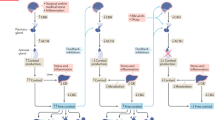Abstract
Assessing adrenal function during acute illness or in patients who are chronically ill with an acute decompensation in their health status can be extremely challenging and complex. It is suggested that serum total cortisol levels and the response of total cortisol to a cosyntropin stimulation test are not reliable markers of adrenal function in severe illness due to multiple factors, including hypoalbuminemia, low serum cortisol binding globulin (CBG) levels, and altered CBG affinity. The same notion applies to patients with liver disease and advanced cirrhosis. In this chapter, we will review the effect of critical illness on the HPA axis and cortisol secretion and present the challenges in the interpretation of an ACTH (cosyntropin) stimulation test in this patient population. Direct measurement of serum free cortisol (SFC), which is the biologically active free fraction of cortisol, can potentially address many of the challenges that we face in the evaluation of the hypothalamic-pituitary-adrenal (HPA) axis in the abovementioned patient population. One of the limiting factors is the lack of specific criteria for diagnosis of adrenal insufficiency using SFC levels. Thus, it is of paramount importance that baseline and post-ACTH stimulation reference ranges be established for serum free cortisol.
Access this chapter
Tax calculation will be finalised at checkout
Purchases are for personal use only
Similar content being viewed by others
References
Hamrahian AH, Oseni TS, Arafah BM. Measurements of serum free cortisol in critically ill patients. N Engl J Med. 2004;350(16):1629–38.
Rauschecker M, Abraham SB, Abel BS, et al. Cosyntropin-stimulated serum free cortisol in healthy, adrenally insufficient, and mildly cirrhotic populations. J Clin Endocrinol Metab. 2016;101(3):1075–81.
Gillies GE, Linton EA, Lowry PJ. Corticotropin releasing activity of the new CRF is potentiated several times by vasopressin. Nature. 1982;299(5881):355–7.
Rivier C, Vale W. Interaction of corticotropin-releasing factor and arginine vasopressin on adrenocorticotropin secretion in vivo. Endocrinology. 1983;113(3):939–42.
Stocco DM, Wang X, Jo Y, Manna PR. Multiple signaling pathways regulating steroidogenesis and steroidogenic acute regulatory protein expression: more complicated than we thought. Mol Endocrinol. 2005;19(11):2647–59.
Kanczkowski W, Sue M, Zacharowski K, Reincke M, Bornstein SR. The role of adrenal gland microenvironment in the HPA axis function and dysfunction during sepsis. Mol Cell Endocrinol. 2015;408:241–8.
Verbeeten KC, Ahmet AH. The role of corticosteroid-binding globulin in the evaluation of adrenal insufficiency. J Pediatr Endocrinol Metab. 2018;31(2):107–15.
Auron M, Raissouni N. Adrenal insufficiency. Pediatr Rev. 2015;36(3):92–102; quiz 103, 129.
Gordon AC, McDonald CF, Thomson SA, Frame MH, Pottage A, Crompton GK. Dose of inhaled budesonide required to produce clinical suppression of plasma cortisol. Eur J Respir Dis. 1987;71(1):10–4.
Woods CP, Argese N, Chapman M, et al. Adrenal suppression in patients taking inhaled glucocorticoids is highly prevalent and management can be guided by morning cortisol. Eur J Endocrinol. 2015;173(5):633–42.
Boonen E, Van den Berghe G. Mechanisms in endocrinology: new concepts to further unravel adrenal insufficiency during critical illness. Eur J Endocrinol. 2016;175(1):R1–9.
Oelkers W. Adrenal insufficiency. N Engl J Med. 1996;335(16):1206–12.
Charmandari E, Nicolaides NC, Chrousos GP. Adrenal insufficiency. Lancet. 2014;383(9935):2152–67.
Gonzalez H, Nardi O, Annane D. Relative adrenal failure in the ICU: an identifiable problem requiring treatment. Crit Care Clin. 2006;22(1):105–118, vii.
Prigent H, Maxime V, Annane D. Science review: mechanisms of impaired adrenal function in sepsis and molecular actions of glucocorticoids. Crit Care. 2004;8(4):243–52.
Gaillard RC, Turnill D, Sappino P, Muller AF. Tumor necrosis factor alpha inhibits the hormonal response of the pituitary gland to hypothalamic releasing factors. Endocrinology. 1990;127(1):101–6.
Jung B, Nougaret S, Chanques G, et al. The absence of adrenal gland enlargement during septic shock predicts mortality: a computed tomography study of 239 patients. Anesthesiology. 2011;115(2):334–43.
Marik PE, Pastores SM, Annane D, et al. Recommendations for the diagnosis and management of corticosteroid insufficiency in critically ill adult patients: consensus statements from an international task force by the American College of Critical Care Medicine. Crit Care Med. 2008;36(6):1937–49.
Hamrahian AH, Fleseriu M, Committee AAS. Evaluation and management of adrenal insufficiency in critically ill patients: disease state review. Endocr Pract. 2017;23(6):716–25.
Annane D, Sebille V, Charpentier C, et al. Effect of treatment with low doses of hydrocortisone and fludrocortisone on mortality in patients with septic shock. JAMA. 2002;288(7):862–71.
Dellinger RP, Levy MM, Rhodes A, et al. Surviving sepsis campaign: international guidelines for management of severe sepsis and septic shock: 2012. Crit Care Med. 2013;41(2):580–637.
Sprung CL, Annane D, Keh D, et al. Hydrocortisone therapy for patients with septic shock. N Engl J Med. 2008;358(2):111–24.
Thevenot T, Borot S, Remy-Martin A, et al. Assessment of adrenal function in cirrhotic patients using concentration of serum-free and salivary cortisol. Liver Int. 2011;31(3):425–33.
Marik PE, Gayowski T, Starzl TE, Hepatic Cortisol R, Adrenal Pathophysiology Study G. The hepatoadrenal syndrome: a common yet unrecognized clinical condition. Crit Care Med. 2005;33(6):1254–9.
Trifan A, Chiriac S, Stanciu C. Update on adrenal insufficiency in patients with liver cirrhosis. World J Gastroenterol. 2013;19(4):445–56.
Bertino G, Privitera G, Purrello F, et al. Emerging hepatic syndromes: pathophysiology, diagnosis and treatment. Intern Emerg Med. 2016;11(7):905–16.
Degand T, Monnet E, Durand F, et al. Assessment of adrenal function in patients with acute hepatitis using serum free and total cortisol. Dig Liver Dis. 2015;47(9):783–9.
Coolens JL, Van Baelen H, Heyns W. Clinical use of unbound plasma cortisol as calculated from total cortisol and corticosteroid-binding globulin. J Steroid Biochem. 1987;26(2):197–202.
Vogeser M, Groetzner J, Kupper C, Briegel J. Free serum cortisol during the postoperative acute phase response determined by equilibrium dialysis liquid chromatography-tandem mass spectrometry. Clin Chem Lab Med. 2003;41(2):146–51.
Author information
Authors and Affiliations
Corresponding author
Editor information
Editors and Affiliations
Rights and permissions
Copyright information
© 2019 Springer Nature Switzerland AG
About this chapter
Cite this chapter
Vamvini, M., Hennessey, J.V. (2019). Adrenal Insufficiency, “Relative Adrenal Insufficiency,” or None of the Above?. In: McDermott, M. (eds) Management of Patients with Pseudo-Endocrine Disorders. Springer, Cham. https://doi.org/10.1007/978-3-030-22720-3_12
Download citation
DOI: https://doi.org/10.1007/978-3-030-22720-3_12
Published:
Publisher Name: Springer, Cham
Print ISBN: 978-3-030-22719-7
Online ISBN: 978-3-030-22720-3
eBook Packages: MedicineMedicine (R0)




